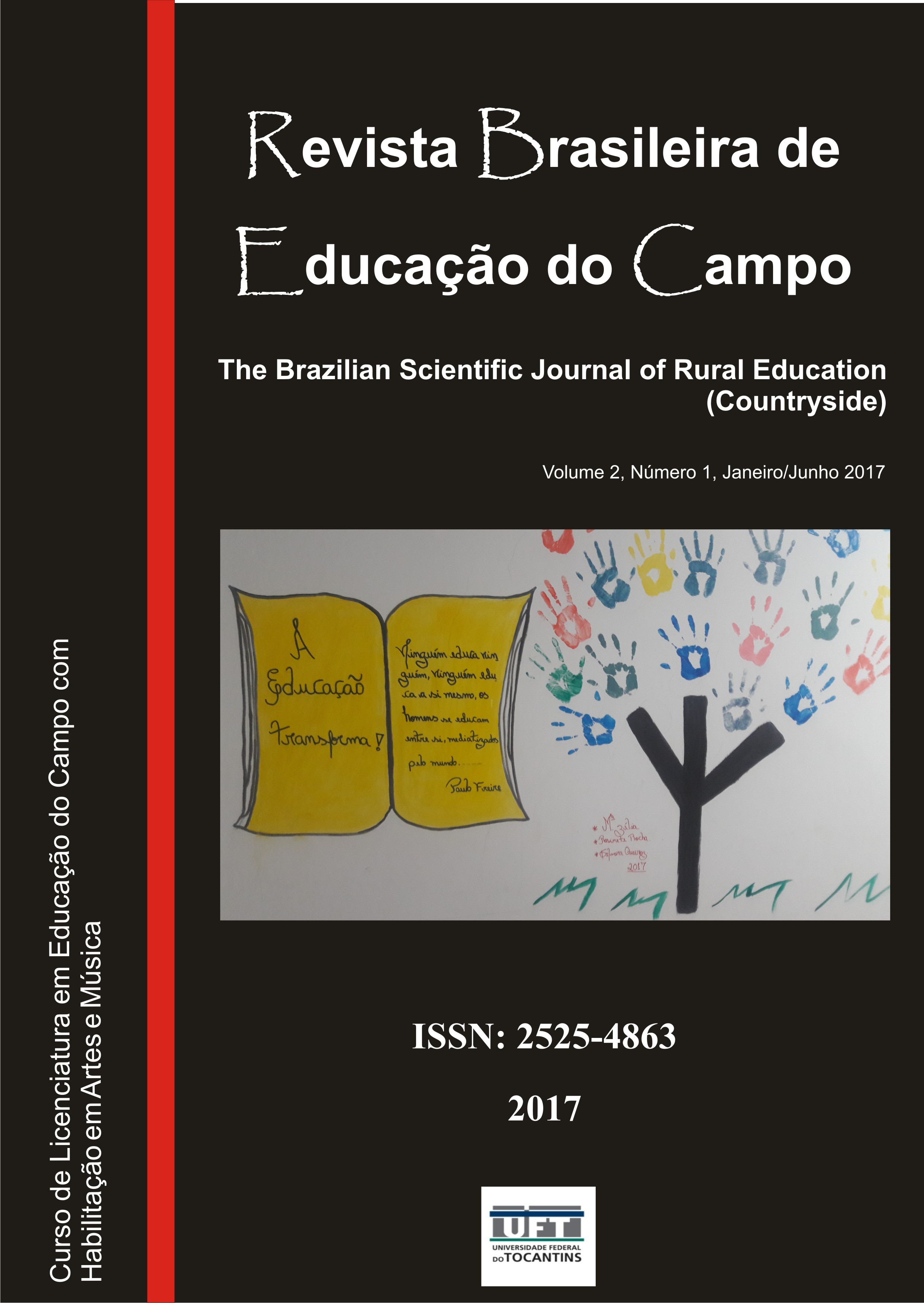Educational projects in the community schools of the Espírito Santo proposals that add up to rural education
DOI:
https://doi.org/10.20873/uft.2525-4863.2017v2n1p23Keywords:
Projetos Pedagógicos, Educação do Campo, Pedagogia da AlternânciaAbstract
ABSTRACT. The Rural Education represents new pedagogical possibilities of education offered in the rural schools of the Espírito Santo. This paper discusses two educational projects carried out in the municipal elementary school Pedra Torta in the city of Águia Branca - ES, also called Community Schools Agroecology with a new idea of school with switching model, off-axis of the Agricultural Family Schools and Integrated State Centers for Rural Education. This model of education is aimed at valuing the rural culture, the cultivation of land, the quality of life and the harmonious balance of the environment. In this context, we have the project “Horta Comunitária and Mãos Que Fazem”. This is a qualitative research conducted through a case study, where was carried out field observations and analysis of documents related to the development of pedagogical projects in the period from 08/04 to 06/22 in 2016. As a result, we can affirm that these experiences enable the perception of the various dimensions of rural reality and valorization of the rural culture.
Downloads
References
Almeida, M. E. B. (2002). Educação, projetos, tecnologia e conhecimento. São Paulo: PROEM.
Batanaz, P. L. (2003). Organizações Escolares. Bases Científicas Desenvolvimento das instituições educativas. Córdoba: Universidade de Córdoba.
Bergamim, M. C. (2006). A Pequena Propriedade Rural no Espírito Santo: constituição e crise de uma agricultura familiar. 44º Congresso da Sociedade Brasileira de Economia, Administração e Sociologia Rural (SOBER). Fortaleza. Recuperado em 08 de dezembro, 2016, em http://www.sober.org.br/palestra/5/952.pdf
Caldart, R. S. (2004). Pedagogia do Movimento Sem Terra. São Paulo: Expressão Popular.
______. (2003). A escola do campo em movimento. Currículo sem Fronteiras, (3), 60-81.
______. (2002). Por uma Educação do Campo: traços de uma identidade em construção. In Educação do Campo: identidade e políticas públicas. Brasília: DF.
COET/IPIS. (2003). Movimentos Migratórios no Estado do Espírito Santo – 1986-1991. Espírito Santo/Vitória. Recuperado em 07 de dezembro, 2016, em file:///C:/Users/jolug/Desktop/20120829_movimentosmigratoriosdoes_1986_1991.pdf
Dremiski, J. L., & Valadão, A. C. (2012). Comunicação Rural e Organização social no Campo. Instituto Federal do Paraná – Educação à Distância.
Goldenberg, M. (2004). A arte de pesquisar: como fazer pesquisa qualitativa em Ciências Sociais. Rio de Janeiro: Record.
Gramsci, A. (1982). Os intelectuais e a organização da cultura. Rio de Janeiro: Civilização Brasileira.
Instituto Brasileiro de Geografia e Estatística. (2014). Censo Demográfico.
Instituto Capixaba de Pesquisa, Assistência Técnica e Extensão Rural. (2013). Programa de Assistência Técnica e Extensão Rural PROATER 2011 – 2013.
Jesus, J. N. (2010). A pedagogia da alternância e o debate da educação no/do campo no estado de Goiás. Revista Nera. 14(18).
Libâneo, J. C., Oliveira, J. F., & Toschi, M. S. (2003). Educação Escolar: políticas, estrutura e organização. São Paulo: Cortez.
Lima, A. V. (2012). Educação do campo e Pedagogia da Alternância: algumas considerações metodológicas. In Entrelaçando: Revista Eletrônica de Culturas e Educação, 6(2), 46-60.
Muniz, V. M., & Carvalho, A. T. (2007). O Programa Nacional de Alimentação Escolar em município do estado da Paraíba: um estudo sob o olhar dos beneficiários do Programa. Revista de Nutrição, 20(3), 285-296.
Pereira, J. L. G. (2008). Educação, gênero e os projetos de vida dos jovens rurais de Baixada de Salinas (RJ). Revista Ruris, 2(2), 71-97.
Rocha, H. C., & Morandi, A. M. (1991). Cafeicultura e grande indústria: a transição no Espírito Santo 1955-1985. Vitória: Fundação Ceciliano Abel de Almeida.
Speyer, A. M. (1983). Educação e campesinato: Uma educação para o homem do meio rural. São Paulo: Edições Loyola.
Veiga, I. P. A. (2003). Inovações e projeto político-pedagógico: uma relação regulatória ou emancipatória? Caderno CEDES, 23(61), 267-281.
Yin, R. K. (2001). Estudo de caso: planejamento e métodos. Porto Alegre: Bookman.
Zamberlan, S. (1995). Pedagogia da Alternância. Piúma: ES. MEPES.
Published
How to Cite
Issue
Section
License
Proposal for Copyright Notice Creative Commons
1. Policy Proposal to Open Access Journals
Authors who publish with this journal agree to the following terms:
A. Authors retain copyright and grant the journal right of first publication with the work simultaneously licensed under the Creative Commons Attribution License that allows sharing the work with recognition of its initial publication in this journal.
B. Authors are able to take on additional contracts separately, non-exclusive distribution of the version of the paper published in this journal (ex .: publish in institutional repository or as a book), with an acknowledgment of its initial publication in this journal.
C. Authors are permitted and encouraged to post their work online (eg .: in institutional repositories or on their website) at any point before or during the editorial process, as it can lead to productive exchanges, as well as increase the impact and the citation of published work (See the Effect of Open Access).















